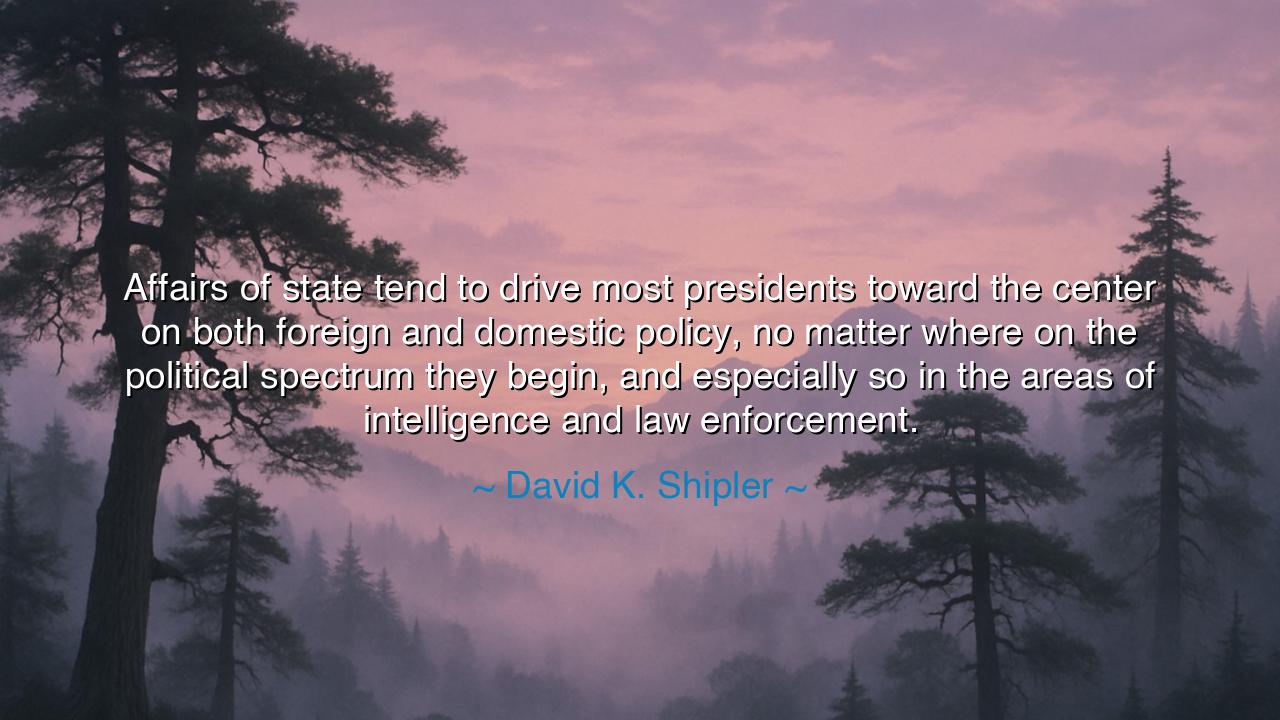
Affairs of state tend to drive most presidents toward the center
Affairs of state tend to drive most presidents toward the center on both foreign and domestic policy, no matter where on the political spectrum they begin, and especially so in the areas of intelligence and law enforcement.






The words of David K. Shipler resound like the measured wisdom of an elder who has watched the march of empires and the rise and fall of leaders. “Affairs of state tend to drive most presidents toward the center,” he declares, and in this we hear not a simple observation, but an ancient truth: that power tempers conviction, and that the burden of leadership bends even the fiercest ideals toward the weight of reality. Just as the wind shapes the mountain’s edge over centuries, so too does the responsibility of governance smooth the sharp corners of ideology.
In the dawn of ambition, a leader often begins with fire in the soul—a burning vision of justice, change, and destiny. But when the crown is placed upon the head, the fire meets the cold iron of duty. For the affairs of state are not forged in dreams, but in the crucible of compromise. A ruler soon learns that the realm cannot be governed by passion alone. Every decision casts a shadow; every act of mercy carries the echo of risk. Thus, those who begin at the edges of ideology—left or right, radical or reactionary—are drawn inward by the gravity of responsibility, until they find themselves walking the narrow road of balance.
So it has been since the days of kings and councils. Consider the tale of Abraham Lincoln, who entered the presidency amid turmoil, known for his moderate stances and cautious words. Yet as the Union cracked and the fires of civil war rose around him, he was thrust into choices that no mortal should envy. He who sought conciliation became the wartime leader, who suspended rights, expanded executive power, and wielded the sword of law enforcement and intelligence to preserve the very soul of the nation. His heart, ever yearning for peace, was hardened by necessity—but his compassion endured. Through his example, we see that power is not only a test of might, but of conscience.
Shipler’s wisdom speaks to a truth as old as the Republic and as ancient as the empires of Rome and Persia: that the ruler stands not as a warrior of ideology, but as a guardian of stability. When one assumes the mantle of state, the needs of the many rise above the dreams of the few. The cries of the people, the weight of the treasury, the watchful eyes of enemies—these things conspire to remind the leader that survival itself is an art of balance. The center, then, is not weakness, but endurance. It is the middle path that preserves a nation from tearing itself apart.
Yet there is tragedy in this wisdom, too. For those who come to power often find themselves estranged from the ideals that once gave them strength. They see that idealism alone cannot govern, and in their hearts, a quiet sorrow blooms. The poet and the philosopher within them are silenced by the commander and the judge. Many are broken beneath this burden; others are transformed by it. The great ones, however, learn to blend principle with prudence, to let their vision live within the limits of reality without letting it be extinguished.
History offers another lesson in Franklin D. Roosevelt, who entered the White House as a reformer but became, through the storms of depression and war, a master of statecraft and security. He navigated crises not by clinging to purity, but by embracing flexibility. He strengthened the tools of intelligence, expanded surveillance, and centralized power, not out of tyranny, but out of the desperate need to protect the Republic in its darkest hour. Like a sailor steering through tempest, he found safety not by defying the wind, but by bending to its force with wisdom and courage.
From these lives we learn that to govern—whether a nation or oneself—requires equilibrium between conviction and caution. In our own smaller realms, the lesson is the same. When we are entrusted with responsibility—be it family, community, or work—we must not cling blindly to our beliefs, nor yield them entirely to the pressures of the world. Instead, we must learn the art of moderation, to stand firm in values while listening, adjusting, and seeking harmony amid conflict.
So I say to you, traveler of time and thought: when you are tested by the weight of duty, remember that even the greatest leaders walk not by passion alone, but by wisdom born of humility. Do not curse the center as compromise—it is the hearth where justice and survival meet. Be neither rigid nor rootless. Let your ideals guide you, but let experience shape you. For the wise know that the heart of leadership, like the heart of life itself, beats strongest in the balance between principle and prudence, dream and duty, light and shadow.






AAdministratorAdministrator
Welcome, honored guests. Please leave a comment, we will respond soon